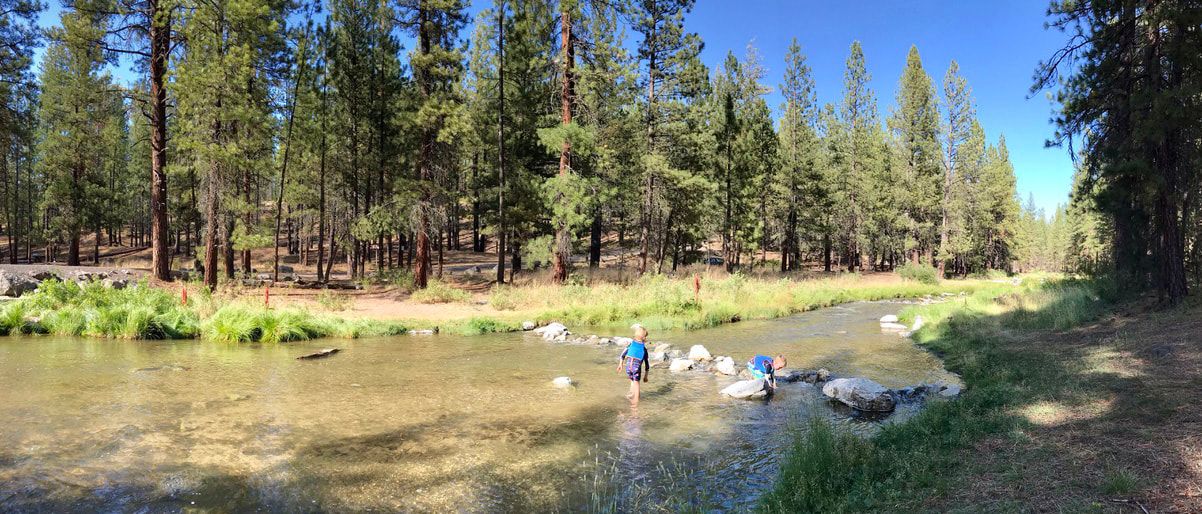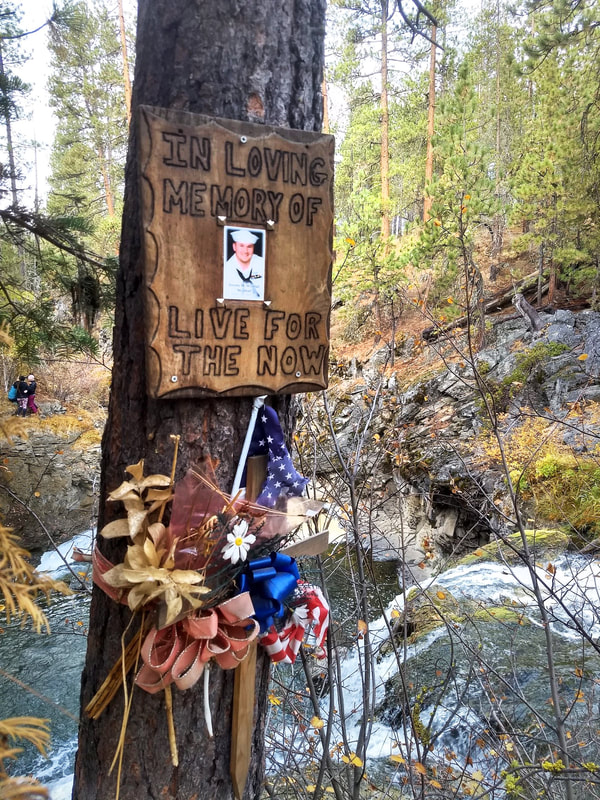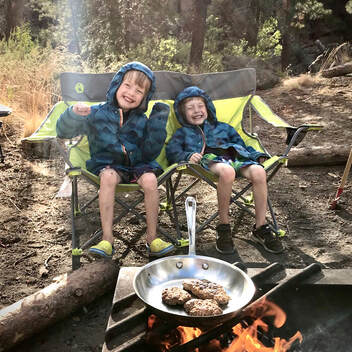Parenting Finally Adds Up.
Hello. My name is Paul. My wife and I were foster parents for seven years, during which we cared for 13 children and adopted twin boys in 2018. Throughout that time, we completed all the state-mandated parenting courses annually, read numerous parenting books, attended workshops and seminars, networked with other foster parents, and stayed updated on the latest parenting methods. Our goal was to provide the children in our care with "A Vibrant Childhood."
In August 2020, my twin boys (then 7) and I were packing for a 4-day father-sons camping trip in the beautiful Central Oregon wilderness. We were headed to a safe campground with campsites on either side of a small, shallow creek. My outdoorsy friends assured me it was the safest campground around.
In August 2020, my twin boys (then 7) and I were packing for a 4-day father-sons camping trip in the beautiful Central Oregon wilderness. We were headed to a safe campground with campsites on either side of a small, shallow creek. My outdoorsy friends assured me it was the safest campground around.
However, upon arrival, I faced a significant challenge. Our campsite was right next to the top of a two-story waterfall with jagged rocks below. My boys and I went to the waterfall so I could explain the serious danger and set important boundaries. We saw the steep drop and the narrow pathway beside the cliff. There was even a memorial plaque for a 20-something Navy sailor who had fallen to his death there. I had two very good reasons to worry—protecting my boys. I set a strict boundary: they were not to go to the waterfall without me. I repeated this rule several times, and they promised to stay away.
With the deadly waterfall addressed, I showed my boys the wonderful, safe areas to play: rocks to climb, fallen trees to balance on, and a creek to enjoy. I reminded them again, "You are not to go to the waterfall without Daddy, do you understand?" They replied, "Yes, Daddy. We won't go to the waterfall. We promise!" I trusted them to listen.
With the deadly waterfall addressed, I showed my boys the wonderful, safe areas to play: rocks to climb, fallen trees to balance on, and a creek to enjoy. I reminded them again, "You are not to go to the waterfall without Daddy, do you understand?" They replied, "Yes, Daddy. We won't go to the waterfall. We promise!" I trusted them to listen.
Soon, my sons saw other boys playing in the creek and asked if they could join. "Okay," I said, "Go have fun, and stay safe. Remember not to go to the waterfall." I watched them from our campsite as they met new friends and started playing. Every few minutes, I checked on them.
But after just 20 minutes, the boys disappeared from the creek. I immediately dropped everything and headed to the top of the waterfall. I heard boys laughing and playing near the waterfall. There, I saw the group of boys walking toward the top of the dangerous waterfall, with my twins following behind.
I acted quickly, shouting their names and demanding they stop. They didn’t hear me. I shouted again, to no avail. Desperately, I tried the “Count To Three” method, which proved ineffective. My boys were oblivious to me and my diminishing parenting skills.
When I caught up to them at the waterfall, I calmly took their hands and led them back to our campsite. They apologized for not listening and promised not to do it again. I stayed silent, trying to think through their consequences. As we entered the campsite, I tripped over a tree root, making me more agitated. I calmed myself and had the boys sit down with me in silence. I needed time to think about their consequences for disobeying me.
Sitting there, I realized I was upset with them and myself. "Why can't my boys just listen to me?" "Why do they break the boundaries I set for them?" I felt they didn't respect me.
I needed to come up with a punishment to make them listen to me. However, I couldn't think of anything effective. My boys often didn’t listen, so what could I do to change that? I wanted wisdom to help my boys make good choices within the boundaries my wife and I set for them. But I was stumped.
But after just 20 minutes, the boys disappeared from the creek. I immediately dropped everything and headed to the top of the waterfall. I heard boys laughing and playing near the waterfall. There, I saw the group of boys walking toward the top of the dangerous waterfall, with my twins following behind.
I acted quickly, shouting their names and demanding they stop. They didn’t hear me. I shouted again, to no avail. Desperately, I tried the “Count To Three” method, which proved ineffective. My boys were oblivious to me and my diminishing parenting skills.
When I caught up to them at the waterfall, I calmly took their hands and led them back to our campsite. They apologized for not listening and promised not to do it again. I stayed silent, trying to think through their consequences. As we entered the campsite, I tripped over a tree root, making me more agitated. I calmed myself and had the boys sit down with me in silence. I needed time to think about their consequences for disobeying me.
Sitting there, I realized I was upset with them and myself. "Why can't my boys just listen to me?" "Why do they break the boundaries I set for them?" I felt they didn't respect me.
I needed to come up with a punishment to make them listen to me. However, I couldn't think of anything effective. My boys often didn’t listen, so what could I do to change that? I wanted wisdom to help my boys make good choices within the boundaries my wife and I set for them. But I was stumped.
“I realized my mindeset was wrong. I had a ‘Just Listen, Or Else’ mentality, thinking that if my children didn’t listen, they needed to be punished.”
I realized my mindset was wrong. I had a "Just Listen, Or Else" mentality, thinking that if my children didn’t listen, they needed to be punished. But did I really want my children to "just listen"? Or did I want them to understand situations and make their own good choices? I wanted the latter, but how?
I was clueless. Needing to calm down, I exhaled deeply and, in frustration, held my breath as a sort of self-punishment. Silly, but that’s what I did. At that moment, I decided to look to God. With barely any air left, I prayed, "Lord, help me."
Immediately, God answered my prayer and gave me what I now call The 1-1 Parenting Principle. In an instant, faster than Neo learning Kung Fu in The Matrix, I thought, "Woah! I know parenting!"
God gave me a new mindset—a miraculous gift I want to share with you. He provided a mechanism using time and natural consequences to guide my children to make good choices within my boundaries to receive good rewards.
I calmly told my boys, "Because you made a poor choice and spent 120 seconds going to the waterfall alone, I am going to claim 120 minutes for myself to recharge. And I'm claiming it now."
They cried, not knowing what would happen in the next two hours. They likely expected a typical consequence that would take away their fun. But that wasn’t what was about to happen. There would be no typical consequences or punishment.
Once they stopped crying, I drew a large line in the dirt around our campsite and explained, "For the next two hours, you can do anything you want within this boundary. You cannot go outside the line, interrupt my time, argue, or fight unless there’s an emergency. If you do, I’ll add more minutes." I reminded them they could play and have fun within the boundaries and encouraged them to make good choices.
They initially argued, as usual. Normally, I’d get more aggravated, but I knew they needed to learn to make good choices. If they made good choices, good things would happen. Poor choices would lead to natural consequences, not punishment.
I was clueless. Needing to calm down, I exhaled deeply and, in frustration, held my breath as a sort of self-punishment. Silly, but that’s what I did. At that moment, I decided to look to God. With barely any air left, I prayed, "Lord, help me."
Immediately, God answered my prayer and gave me what I now call The 1-1 Parenting Principle. In an instant, faster than Neo learning Kung Fu in The Matrix, I thought, "Woah! I know parenting!"
God gave me a new mindset—a miraculous gift I want to share with you. He provided a mechanism using time and natural consequences to guide my children to make good choices within my boundaries to receive good rewards.
I calmly told my boys, "Because you made a poor choice and spent 120 seconds going to the waterfall alone, I am going to claim 120 minutes for myself to recharge. And I'm claiming it now."
They cried, not knowing what would happen in the next two hours. They likely expected a typical consequence that would take away their fun. But that wasn’t what was about to happen. There would be no typical consequences or punishment.
Once they stopped crying, I drew a large line in the dirt around our campsite and explained, "For the next two hours, you can do anything you want within this boundary. You cannot go outside the line, interrupt my time, argue, or fight unless there’s an emergency. If you do, I’ll add more minutes." I reminded them they could play and have fun within the boundaries and encouraged them to make good choices.
They initially argued, as usual. Normally, I’d get more aggravated, but I knew they needed to learn to make good choices. If they made good choices, good things would happen. Poor choices would lead to natural consequences, not punishment.
“Every time we argue with Daddy, we lose time to play.”
They complained, and for each poor choice, I calmly added a minute. One son tried bargaining with me, but I stayed consistent. After ten arguments, one boy stopped his brother from arguing, saying, “Every time we argue with Daddy, we lose time to play.” Instantly, they became quiet.
I encouraged them to speak up, using a bit of reverse psychology, but they chose not to. They learned to make good choices, realizing that good things happen as a result. They learned to control their own destiny.
I then started my two hours and 10 minutes of restoration time, moving my chair to the shade with a view of the creek. I began sketching the landscape. The boys soon realized I was serious about my time and began playing within the campsite. They chased chipmunks, collected firewood, and dug holes in the dirt, having a blast. The only consequence was a temporary reduction of their boundaries.
When my time was up, I told the boys they could go and play, reminding them of the natural consequences if they broke the boundaries. They assured me they wouldn’t go to the waterfall again and would only play by the creek. I trusted them, and off they went with joy.
I encouraged them to speak up, using a bit of reverse psychology, but they chose not to. They learned to make good choices, realizing that good things happen as a result. They learned to control their own destiny.
I then started my two hours and 10 minutes of restoration time, moving my chair to the shade with a view of the creek. I began sketching the landscape. The boys soon realized I was serious about my time and began playing within the campsite. They chased chipmunks, collected firewood, and dug holes in the dirt, having a blast. The only consequence was a temporary reduction of their boundaries.
When my time was up, I told the boys they could go and play, reminding them of the natural consequences if they broke the boundaries. They assured me they wouldn’t go to the waterfall again and would only play by the creek. I trusted them, and off they went with joy.
|
For the remaining three days at the campground, they stayed away from the waterfall and didn’t give me any more time. It became a fun game, with me begging for more minutes and them giggling, "No way, Daddy!" This gave me my energy back.
With this new mindset, we had the best camping trip ever. They made good choices, respected my boundaries, and I was stress-free. We met new friends, went on hikes, played in the creek, and more. We all had a blast because of our mutual respect for boundaries. When we got home, the boys shared our adventures with Mommy, and I shared the 1-1 principle with her. I continued using the 1-1 Family techniques regularly, but only needed it for three months as they formed the habit of making good choices. |





